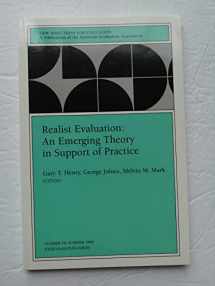
Realist Evaluation: An Emerging Theory in Support of Practice: New Directions for Evaluation, Number 78 (J-B PE Single Issue (Program) Evaluation)
ISBN-13:
9780787915513
ISBN-10:
0787915513
Edition:
1
Author:
Melvin M. Mark, Gary T. Henry, George Julnes
Publication date:
1998
Publisher:
Jossey-Bass
Format:
Paperback
109 pages
FREE US shipping
Book details
ISBN-13:
9780787915513
ISBN-10:
0787915513
Edition:
1
Author:
Melvin M. Mark, Gary T. Henry, George Julnes
Publication date:
1998
Publisher:
Jossey-Bass
Format:
Paperback
109 pages
Summary
Realist Evaluation: An Emerging Theory in Support of Practice: New Directions for Evaluation, Number 78 (J-B PE Single Issue (Program) Evaluation) (ISBN-13: 9780787915513 and ISBN-10: 0787915513), written by authors
Melvin M. Mark, Gary T. Henry, George Julnes, was published by Jossey-Bass in 1998.
With an overall rating of 4.3 stars, it's a notable title among other
Psychotherapy, TA & NLP
(Psychology & Counseling, Psychotherapy, TA & NLP, Psychology) books. You can easily purchase or rent Realist Evaluation: An Emerging Theory in Support of Practice: New Directions for Evaluation, Number 78 (J-B PE Single Issue (Program) Evaluation) (Paperback) from BooksRun,
along with many other new and used
Psychotherapy, TA & NLP
books
and textbooks.
And, if you're looking to sell your copy, our current buyback offer is $0.49.
Description
Why is another theory of evaluation needed? The paradigm wars have left a void in their wake. A new theory, firmly grounded in a credible philosophy of science, is needed to guide practice. The aim of this volume is to provide a new theory that captures the sensemaking contributions from post-positivism and the sensitivity to values from constructivist traditions. The theory presented here is not a slap-dash synthesis of the competing paradigms--it is a new approach. Some of the contributions of the realist theory of evaluation are (1) providing a basis for principled discovery as we oscillate between explanations and data; (2) using explanation as a means for extrapolating findings from one evaluation to other settings; (3) viewing all methods, both quantitative and qualitative, as aids to sensemaking that have strengths and flaws; (4) connecting evaluation practice with the ultimate goal of most program evaluation--social betterment; and (5) balancing the focus of the evaluation between sensemaking and value inquiry. This is the 78th issue of the quarterly journal New Directions for Evaluation.


We would LOVE it if you could help us and other readers by reviewing the book
Book review

Congratulations! We have received your book review.
{user}
{createdAt}
by {truncated_author}


